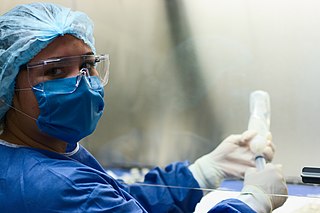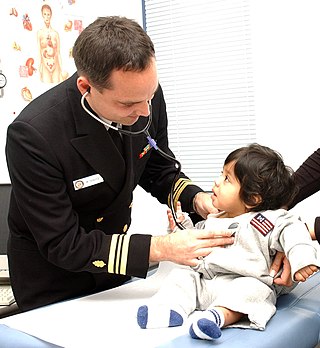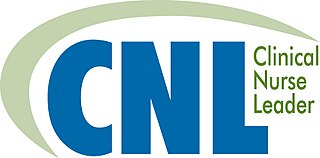
A registered nurse (RN) is a nurse who has graduated or successfully passed a nursing program from a recognized nursing school and met the requirements outlined by a country, state, province or similar government-authorized licensing body to obtain a nursing license. An RN's scope of practice is determined by legislation, and is regulated by a professional body or council.

An oncology nurse is a specialized nurse who cares for cancer patients. These nurses require advanced certifications and clinical experiences in oncology further than the typical baccalaureate nursing program provides. Oncology nursing care can be defined as meeting the various needs of oncology patients during the time of their disease including appropriate screenings and other preventive practices, symptom management, care to retain as much normal functioning as possible, and supportive measures upon end of life.

A nurse practitioner (NP) is an advanced practice registered nurse and a type of mid-level practitioner. NPs are trained to assess patient needs, order and interpret diagnostic and laboratory tests, diagnose disease, prescribe medications and formulate treatment plans. NP training covers basic disease prevention, coordination of care, and health promotion.
An advanced practice nurse (APN) is a nurse with post-graduate education and training in nursing. Nurses practicing at this level may work in either a specialist or generalist capacity. APNs are prepared with advanced didactic and clinical education, knowledge, skills, and scope of practice in nursing.
A Master of Science in Nursing (MSN) is an advanced-level postgraduate degree for registered nurses and is considered an entry-level degree for nurse educators and managers. The degree may also prepare a nurse to seek a career as a nurse administrator, health policy expert, or clinical nurse leader. The MSN may be used as a prerequisite for doctorate-level nursing education and is the minimum degree required to become an advanced practice registered nurse such as a nurse practitioner, clinical nurse specialist, nurse anesthetist, or nurse midwife.
The Doctor of Nursing Practice (DNP) is a professional degree in nursing in the United States of America.
Nursing credentials and certifications are the various credentials and certifications that a person must have to practice nursing legally. Nurses' postnominal letters reflect their credentials—that is, their achievements in nursing education, licensure, certification, and fellowship. The letters usually appear in the following order:
A clinical nurse specialist (CNS) is an advanced practice nurse who can provide advice related to specific conditions or treatment pathways. According to the International Council of Nurses (ICN), an Advanced Practice Nurse is a registered nurse who has acquired the expert knowledge base, complex decision-making skills and clinical competencies for expanded practice, the characteristics of which are shaped by the context and/or country in which s/he is credentialed to practice.
Nursing in the United Kingdom is the largest health care profession in the country. It has evolved from assisting doctors to encompass a variety of professional roles. Over 700,000 nurses practice, working in settings such as hospitals, health centres, nursing homes, hospices, communities, military, prisons, and academia. Most are employed by the National Health Service (NHS).

Nursing in the United States is a professional health care occupation. It is the largest such occupation, employing millions of certified professionals. As of 2023, 3,175,390 registered nurses were employed, paid a median income of $86,070.

Gerontological nursing is the specialty of nursing pertaining to older adults. Gerontological nurses work in collaboration with older adults, their families, and communities to support healthy aging, maximum functioning, and quality of life. The term gerontological nursing, which replaced the term geriatric nursing in the 1970s, is seen as being more consistent with the specialty's broader focus on health and wellness, in addition to illness.
A surgical nurse, also referred to as a theatre nurse or scrub nurse, specializes in perioperative care, providing care to patients before, during and after surgery. To become a theatre nurse, Registered Nurses or Enrolled Nurses must complete extra training. Theatre nurses can focus on different speciality areas, depending on which they are interested in.
The American Nurses Credentialing Center (ANCC), a subsidiary of the American Nurses Association (ANA), is a certification body for nursing board certification and the largest certification body for advanced practice registered nurses in the United States, as of 2011 certifying over 75,000 APRNs, including nurse practitioners and clinical nurse specialists.

Clinical Nurse Leader (CNL) is a nursing role that was developed in the United States to prepare highly skilled nurses focused on the improvement of quality and safety outcomes for patients or patient populations. The CNL is a registered nurse, with a Master of Science in Nursing who has completed advanced nursing coursework, including classes in pathophysiology, clinical assessment, finance management, epidemiology, healthcare systems leadership, clinical informatics, and pharmacology. CNLs are healthcare systems specialists that oversee patient care coordination, assess health risks, develop quality improvement strategies, facilitate team communication, and implement evidence-based solutions at the unit (microsystem) level. CNLs often work with clinical nurse specialists to help plan and coordinate complex patient care.
A registered dental nurse (RDN) in the United Kingdom works as part of a dental team in a variety of clinical and non-clinical settings.
The Michigan State University College of Nursing is the nursing college at Michigan State University. It is located on the southeastern side of campus in East Lansing, Michigan, United States. The college is centered in the Life Sciences Building. The dean of the school is Leigh Small. The College of Nursing is among the top 100 graduate nursing programs in the country, ranking at #36 in the nation according to U.S. News & World Report. The College of Nursing at Michigan State University offers a professional student environment that fosters professional and personal development of pre-nursing and nursing students. The college shares the university's research, compassion, and high-achieving educational goals. The college provides several options to become a nurse or advance your nursing education. Those include: BSN Pathways, MSN concentrations, DNP program, PhD program and various continuing education opportunities.
Nursing in Japan did not develop as an occupation until the end of the nineteenth century. Initially introduced only in Tokyo in the late 1860s, small schools utilizing Western models were being opened by the late 1880s. In response to disaster relief, the Japanese Red Cross became an integral part of nursing development. By 1915, nurse registration had been established and public health nurses began working throughout the country. Nursing universities were established in the twentieth century and regulations were passed to develop standards for training and public health.
The Byrdine F. Lewis College of Nursing and Health Professions contains the nursing school and school of allied health professions at Georgia State University.
Nursing educational programs in Iran are similar to the nursing educational programs in other countries in many aspects. Holding a secondary school diploma and passing the entrance exam is necessary for the admission. The entrance exams to governmental universities and Azad University are held separately. The duration of the associate degree course for operating room and anesthesia is two years, a bachelor's degree in nursing is four years, a master's degree in nursing is two to two and a half years, and a doctorate degree in nursing is four to five years.






